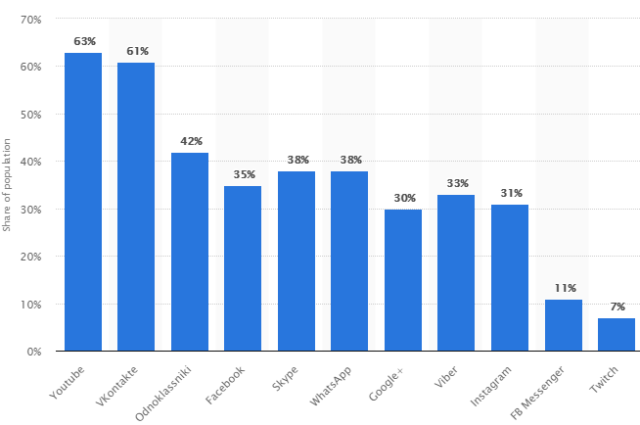Russia telecoms operators have proposed a new legislation demanding foreign Internet companies to pay for storing data in the country, Reuters reported.

The mobile subscriber base in Russia dropped by 0.1 percent to 255.41 million in 2017. Russia’s mobile market penetration rate was 179 percent. Mobile operators have sold 109 million SIM cards in Russia in 2017.
According to industry estimates, Russia had around 75 million social network users, up from 65.5 million in 2014.
The legislation, if adopted, would allow Russian telecom operators such as MTS, Megafon, Rostelecom, VimpelCom and Tele2, among others, to claim compensation from foreign Internet companies, including social media and messenger services such as Google and Facebook, for compliance with the data storage rules that come into effect from October, Reuters reported recently.
Russian communications watchdog Roskomnadzor could be allowed to reduce the speed of access to their websites for Russian users if foreign Internet companies refuse to comply, the report said.
“The bill will be sent to the government as soon as all mobile operators reach a harmonized position,” a senior manager at one of Russia’s telecoms companies told Reuters.
Rostelecom, a leading Russian telecoms operator, supported the notion of spreading the data storage costs with foreign Internet companies.
MegaFon, which would not comment on the draft legislation, said all interested parties — not only telecom operators — should take part in the development of Internet resources.
The cost for Russia’s three largest telecoms operators — MTS, MegaFon and VimpelCom — of creating and sustaining a system to store data to comply with the law will reach 145 billion rubles or £1.7 billion over the next five years.
Russian telecoms operators do not have the necessary infrastructure in place to store users’ data.
They will also have to use foreign technology to comply with the data storage law, even though Russian President Vladimir Putin has ordered his government to ensure that local companies produce the equipment.
The development will benefit networking companies such as Cisco, Dell EMC, HPE, Juniper Networks, IBM, Huawei, among others.
Technology vendor revenue from sales of infrastructure products such as server, storage, and Ethernet switch for cloud IT grew 45.5 percent in the first quarter of 2018 to $12.9 billion. IDC also raised its forecast for total spending on cloud IT infrastructure in 2018 to $57.2 billion with 21.3 percent growth.
Baburajan K





